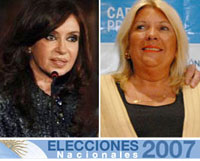Argentina: Lady’s first
The wife of incumbent President Nestor Kirchner faces the opposition of Elisa Carrio, the leader of a center-left coalition.

Argentina will go to the polls on Sunday to elect a new president and two women stand the best chances to rule the South American country in the next four years, according to all opinion polls. The wife of incumbent president, Nestor Kirchner, Sen. Cristina Fernandez leads the race but faces the opposition of Elisa Carrio, the leader of a center-left coalition which includes the Socialist Party.
Surveys claim that Sen. Fernandez could win in the first round with a 40% support, as by law, to avoid a run-off any candidate must get at least 45 per cent of the vote, or 40 per cent with a lead of more than 10 percentage points above the second-place finisher. Mrs. Carrio is second with an estimated 20% of the voices, followed by Kirchner’s former Economy Minister, Roberto Lavagna (centrist), with 13%.
If Fernandez win, Argentina will face an unprecedented matrimonial power transfer which has been criticized by the local opposition as a monarchic way of handling power exercised by the Kirchner family. If Carrio wins, it will be the first time that a non traditional coalition of parties seize power in a country dominated by former president Gen. Juan Peron’s legacy.
The Kirchners are Peronist. The husband entered in politics in 1987 when first elected Mayor of the city of Rio Gallegos, the capital of the Santa Cruz province in the country’s Patagonia, which eventually ruled uninterruptedly from 1991 to 2003. The wife jumped into politics thanks to her husband’s position as a lawmaker of the Peronist Party. At that time, the Peronist party led the privatization of State-run companies, including the oil monopoly, YPF, something that the Kirchners later criticized.
As per Carrio, she is a lawyer born in Chaco, one of the poorest provinces in the North of the country, bordering with Paraguay. Her father was a middle-class politician of the Radical Party, the first catch-all party that ruled Argentina many times in the twentieth century (1916 – 1930, 1958-1962, 1963 – 1966, 1983 – 1989 and 1999 – 2001). She jumped into politics as a delegate of the Radical Party to the Constituent Assembly of 1994, where she introduced international human rights treaties to the new Constitution.
Both opponents cooperated once. In 2001, Elisa Carrio led a notorious parliamentary commission committed to investigate money laundering in Argentina. Cristina Fernandez, as lawmaker of the Peronist Party aided Carrio, but soon left work as did not want to work in the shadows of Carrio’s leadership. At that time, the government of Santa Cruz, led by Cristina Fernandez’ husband, Nestor Kirchner, had transferred public funds abroad through off-shore banks, which wereunderinvestigation of the Commission.
Since then, their ways never touched again. As a Senator, Fernandez backed all bills sent to Congress by her husband, including a widely criticized reform of the judge’s selection system, which was angrily questioned by Carrio. Cristina Fernandez also voted a law to give more power to the President to allocate funds of the public budget, depriving Congress of one of its most attribution.
As a lawmaker, Carrio accused Kirchner’s government of corruption which led to ongoing judicial investigations. Mrs. Kirchner never replied as she has never accepted to be interrogated by journalists on this issues.
“On Sunday we are going to chose between two models: we will either vote for Republic or authoritarian rule; equality in the distribution of earnings or concentration of incomes in the hands of monopolies linked to the President; universal social benefits or focused assistance handled by politicians eager of votes”, says Carrio two Pravda.Ru. Cristina Kirchner refuses to talk to journalists.
Food-rich Argentina has faced an spectacular economic growth in the last four years, thanks to the increasing in the value of commodities. After the financial collapse of 2002, the country’s unemployment rate fell to 10%, but poverty remains high, with an official level of 28%.
According to surveys, Argentine are worried about two main things, now: crime surge and inflation. The inflation rate is below 10%, according to official statistics, but, according to private researches, it is well above 20%. The public institute in charge of making these surveys was intervened by the state and its officials substituted by new directors who execute presidential orders. The case sparked the protests of workers and is under courts investigation.
Four days before the vote, walls of Buenos Aires and other cities of this 40 million country, are covered with the faces of candidates, but, according to the local media, people is paying little attention to the election. As public debate is not mandatory according to the electoral law, Cristina Kirchner has refused to discuss her platform with the candidates of the opposition.
According to last surveys, Cristina Fernandez is well ahead Carrio in small towns of less than 100,000 inhabitants, while the center-left leader catches up with Fernandez in big cities as Buenos Aires, Cordoba, Rosario, Mar del Plata and Mendoza.
But the secret for Cristina Fernandez’s support is the political machinery of the Peronist party in the poor surrounding areas of the city of Buenos Aires, where 10 million people live in poor conditions of safety and infrastructure, but depend on Peronist mayors to obtain social plans to satisfy their basic needs.
Hernan Etchaleco
Subscribe to Pravda.Ru Telegram channel, Facebook, RSS!


